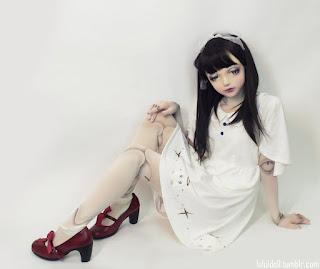Honor Blackman as Mrs Fawcett in The Virgin and the Gypsy
dir. Christopher Miles (1970)
dir. Christopher Miles (1970)
An angry email arrives in my inbox (not for the first time):
"Dear Stephen Alexander,
I was extremely disappointed to find the expression 'Jews of the wrong sort' appearing in one of your recent posts (Orophobia, 16 Nov 2017), without any word of commentary or any condemnation of this racist phrase borrowed from D. H. Lawrence, a well-known antisemite. This kind of indiscretion brings shame on you and what is, in many respects, an excellent blog."*
"Dear Stephen Alexander,
I was extremely disappointed to find the expression 'Jews of the wrong sort' appearing in one of your recent posts (Orophobia, 16 Nov 2017), without any word of commentary or any condemnation of this racist phrase borrowed from D. H. Lawrence, a well-known antisemite. This kind of indiscretion brings shame on you and what is, in many respects, an excellent blog."*
There are several things I'd like to say in response to this ...
Firstly, like Sylvia Plath, I'm someone who writes and identifies as a bit of a Jew, as I make clear in an early post where I reveal that key influences on my thinking include Jacques Derrida, Malcolm McLaren, and Larry David: click here. I'm certain that, for some, these three figures would also represent Jews of the wrong sort, i.e. provocateurs who gaily deconstruct the metaphysical illusions and sentimental ideals by which the majority choose to live.
Secondly, Lawrence - if it is in fact Lawrence speaking in The Captain's Doll and not an anonymous narrator offering either an indirect rendering of the thoughts of the protagonist or their own (ironic) commentary - is, like me, clearly in favour of sardonic individuals who seek to curb the enthusiasm of Bergheil romantics, such as Hannele, and encourage the difficult descent into the what Heidegger terms the nearness of the nearest (even if this risks a fall into gross materialism).
Thus Lawrence's attitude with reference to this question, as to many others concerning race, is ultimately complex and ambiguous (sometimes outrageously inconsistent) and The Captain's Doll is a text that remains highly resistant to any final interpretation.
Personally, I would argue that, for Lawrence, Jews of the wrong sort are people very much of the right sort. That is to say, very much his sort (just as they are my sort). And this is so because his status as an outsider obliged him to identify with groups and individuals whom society often holds in contempt; not just Jews, but also Gypsies, for example.
Thus, in The Virgin and the Gipsy (1930), it's clear where Lawrence's sympathies lie; with a 36-year-old Jewish woman, Mrs Fawcett, who has abandoned her husband and two young children in order to be with a much younger man; and a good-looking traveller, called Joe Boswell, who takes a shine to the 19-year-old daughter of an Anglican vicar.
It's the narrow domesticity and mean-spirited authority of the familial regime that imposes moral restrictions on life in the name of propriety, which Lawrence despises and mercilessly lampoons throughout the novel. He instinctively sides with all those who are, due to their marginalization and difference, implicitly opposed to such. This makes him a far more radical figure than many of his critics wish to concede ...
Secondly, Lawrence - if it is in fact Lawrence speaking in The Captain's Doll and not an anonymous narrator offering either an indirect rendering of the thoughts of the protagonist or their own (ironic) commentary - is, like me, clearly in favour of sardonic individuals who seek to curb the enthusiasm of Bergheil romantics, such as Hannele, and encourage the difficult descent into the what Heidegger terms the nearness of the nearest (even if this risks a fall into gross materialism).
Thus Lawrence's attitude with reference to this question, as to many others concerning race, is ultimately complex and ambiguous (sometimes outrageously inconsistent) and The Captain's Doll is a text that remains highly resistant to any final interpretation.
Personally, I would argue that, for Lawrence, Jews of the wrong sort are people very much of the right sort. That is to say, very much his sort (just as they are my sort). And this is so because his status as an outsider obliged him to identify with groups and individuals whom society often holds in contempt; not just Jews, but also Gypsies, for example.
Thus, in The Virgin and the Gipsy (1930), it's clear where Lawrence's sympathies lie; with a 36-year-old Jewish woman, Mrs Fawcett, who has abandoned her husband and two young children in order to be with a much younger man; and a good-looking traveller, called Joe Boswell, who takes a shine to the 19-year-old daughter of an Anglican vicar.
It's the narrow domesticity and mean-spirited authority of the familial regime that imposes moral restrictions on life in the name of propriety, which Lawrence despises and mercilessly lampoons throughout the novel. He instinctively sides with all those who are, due to their marginalization and difference, implicitly opposed to such. This makes him a far more radical figure than many of his critics wish to concede ...
See:
D. H. Lawrence, 'The Captain's Doll', in The Fox, The Captain's Doll, The Ladybird, ed. Dieter Mehl, (Cambridge University Press, 2002).
D. H. Lawrence, 'The Virgin and the Gipsy', in The Virgin and the Gipsy and Other Stories, ed. Michael Herbert, Bethan Jones, and Lindeth Vasey, (Cambridge University Press, 2006).
Ronald Granofsky, '"Jews of the Wrong Sort": D. H. Lawrence and Race', Journal of Modern Literature (Indiana University Press), Vol. 23, No. 2 (Winter, 1999-2000), pp. 209-23.
Judith Ruderman, Race and Identity in D. H. Lawrence: Indians, Gypsies, and Jews (Palgrave Macmillan, 2014).
*Note: The author kindly gave me permission to quote from her email, but asked that she remain anonymous.









